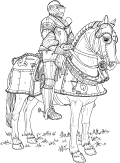A fish too far.
Dear Word Detective: The Economist this past week used the term “cod-medieval.” A Google search turns up a few hundred hits, all of them referring to the pseudo-magical-medieval D&D-type thing, but no clear definitions. Is there a more precise definition, and where does it come from? — Joshua Engel.
Forsooth, you betcha. Just let me get my chain-mail and battle axe, and I’ll be right with you. OK, first, an explanation of “D&D,” which is short for “Dungeons and Dragons,” a board game enormously popular since the 1980s. The rules of D&D are arcane (at least they look complex, and I have no intention of reading them), but it is what aficionados of the genre call an “RPG,” or “role playing game,” where players take on the personalities of “medieval” characters and slay dragons in dungeons, or something. I’d explain further, but I have to go upstairs for supper now.
The Economist article you cite concerns “World of Warcraft” (WoW), a popular D&D-ish online game, where real-world epidemiologists recently discovered some interesting things about human behavior when parts of the WoW game world were infected with an imaginary plague. Personally, I have my doubts about basing public health policy on the reactions of people whose diet consists of Mountain Dew and pot-noodles. But there are nine million WoW-ers, so I may be wrong.
 In any case, the Economist takes clear delight in using the term “cod-medieval” — twice — to describe the game. “Medieval” (from the Latin “medium aevum”), of course, means the Middle Ages, roughly from the fifth to the fifteenth centuries, the vague setting of such fantasy games. “Cod,” as you have gathered, means “fake, phony, mock,” and thereby hangs our tale.
In any case, the Economist takes clear delight in using the term “cod-medieval” — twice — to describe the game. “Medieval” (from the Latin “medium aevum”), of course, means the Middle Ages, roughly from the fifth to the fifteenth centuries, the vague setting of such fantasy games. “Cod,” as you have gathered, means “fake, phony, mock,” and thereby hangs our tale.
“Cod” meaning “phony” has been British slang since the early 20th century, and although “cod” to me immediately conjures up visions of fish and chips, the connection of this “cod” to that is open to question. “Cod,” apart from fishy uses, has actually been slang since the late 17th century, but its original sense (for our purposes here) was to mean “fellow” (especially an old man) or, a bit more pungently, “fool” (“Ye vile drunken cod,” 1878). Some authorities have proposed that this “cod” was actually short for “codger,” meaning “a stingy and/or peculiar old man.” But apparently “cod” in this sense is found in the written record earlier than “codger,” so that explanation is considered dubious (although not impossible, given the spotty nature of the written record in that period).
Another possibility, favored by the eminent etymologist Eric Partridge, is that “cod” in the “old fool” sense was short for the derogatory term “cod head,” i.e., as empty of sense as a fish’s head. This sense of mindlessness might then have evolved to mean “without substance” or “phony.” In any case, we can consider ourselves lucky to have such a nifty little modifier as “cod” to quietly signal “fake.”
—-
Note: Several readers wrote me after this column appeared to ask if that “cod,” meaning “phony,” was somehow related to “codpiece.” Apparently it isn’t. “Cod” (phony) may be related to the codfish, but “codpiece” is derived from an unrelated Germanic root meaning “bag.” I didn’t explore this in my column both because of space restrictions and because my column runs in some fairly conservative venues where editors wouldn’t welcome a discussion of “codpiece.”




Anyone who has ever played D&D will tell you it is NOT a board game. There is no standard “board” for D&D as there is for, say, Monopoly or Scrabble. DMs or Dungeon Masters create a “world” that the players inhabit. Sometimes it exists on mere graph paper and sometimes it exists in premade “modules” that the less creative can buy off the shelf, but mostly it exists in the players imaginations.
How egregious of me to have left the apostrophe out of “players'”. I need to proofread more carefully!
is there any link to the term ‘codswallop’
I’m not sure that there is any hope of being answered here, but I do see that someone else waited five years between comments, so I’ll try.
Is cod as a fish used to represent other fish, ever? Like the white fish used in imitation crab?
Peter Pan called hook an old codfish
‘Cod’ is more interesting than you imply. It has an invariant plural and can be a noun, a verb, an adjective or even an adverb. It can therefore be used to construct sentences of any length all composed of the same word ‘cod’. See https://bevrowe.wordpress.com/2011/01/22/assertress-2/ for details.